Posted November 5, 2019 by Nicky in Reviews / 0 Comments
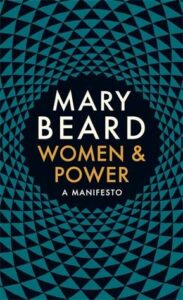 Women & Power: A Manifesto, Mary Beard
Women & Power: A Manifesto, Mary Beard
The discussion of the female voice (literally) in the halls of power, the first essay of this book, is absolutely great and exactly within Beard’s professional ambit. She discusses perceptions of the female voice, and how the dislike of “shrill” women has been embedded in us in what we consider to be foundational texts for Western civilisation (Homer, etc). I saw someone on Twitter just the other day realising that they disliked Alexandria Ocasio-Cortez’s voice in exactly the way Beard discusses.
The second essay is a little less focused, I think. She looks at some great parallels in literature and such, but it feels a bit less focused and conclusive. (Not that the first essay particularly comes to a rousing conclusion, beyond “we need to be conscious of this”…)
I suppose part of the problem is that no one really has these answers. It’s a worthy read for posing some of the questions, and for showing some of the workings we may not even think about, nonetheless.
Rating: 4/5
Tags: book reviews, books, non-fiction
Posted October 17, 2019 by Nicky in Reviews / 2 Comments
 The Border, Diarmaid Ferriter
The Border, Diarmaid Ferriter
This book professes to explain the importance of the Irish border, and to delve into its importance in the Brexit negotiations. I thought this was something worth informing myself about, because my knowledge of Irish history of any era is fairly limited, and I want to be better informed. This… is not a good place to start, I think: it throws names of politicians and political parties at you rapid-fire, and expects you to already have much of the context in mind. That makes some sense in a book focused on the border, but I’d still start with a bit of context to help orient people who are picking the book up for the reasons I did.
In the end, I couldn’t finish it. I found the style too dry and it just wasn’t calibrated for the level of knowledge I went in with. I’m sure it’s fine if you’re interested in the topic already, but then, a primer on the topic is why I thought the book would be useful, so it’s a little misleading in terms of the jacket copy.
Rating: 1/5
Tags: book reviews, books, history, non-fiction
Posted October 15, 2019 by Nicky in Reviews / 0 Comments
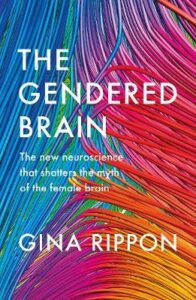 The Gendered Brain, Gina Rippon
The Gendered Brain, Gina Rippon
Gina Rippon and other writers like Cordelia Fine between them attempt to totally rip to shreds the idea that there are such things as “male brains” and “female brains”, writing convincing critiques of studies which are then just as convincingly critiqued in their turn. It’s difficult for someone outside the field (even someone with a biology degree that included modules on human biology and on “the science of the mind”) to know how to pick this apart, and I worry that a lot of the time we go looking for someone who supports our view, and then believe them because they sound most convincing. (And of course they do! It’s easy to convince someone of something they already believe.)
In terms of the book itself, Rippon’s not as engaging as Cordelia Fine; I actually got a little bored and bogged down at some points. It definitely wouldn’t be my first choice as a primer for a pop-sci book that’s sceptical of the pink-brain-blue-brain debate. There are some interesting sections: the discussion of attitudes toward menstruation is particularly interesting, as it suggests many of our negative ideas about menstruation (including PMS) are culturally received. (Then again, Rippon doesn’t engage with the genuine issues of people with conditions like PCOS or endometriosis, which very clearly make periods exactly the misery people fear.)
In terms of the evidence presented, I think some of the debunking is useful for sure, and the reminders that some of these differences are actually vanishingly small. However, Rippon uses examples of women with high testosterone, and possibly other intersex characteristics as well, without bothering to think about whether it’s the binary that’s serving us poorly. We know that biologically, sex is a spectrum with groupings around two points, not two separate and wholly discrete categories. I’d love to see more work dealing with that and what that might mean; this book ain’t it, because it tacitly accepts from the start that there are men and women, and that everyone can be sorted into one of those two boxes.
Rating: 3/5
Tags: book reviews, books, non-fiction, science
Posted October 13, 2019 by Nicky in Reviews / 0 Comments
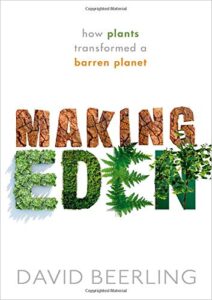 Making Eden: How Plants Transformed a Barren Planet, David Beerling
Making Eden: How Plants Transformed a Barren Planet, David Beerling
I picked this up on the strength of The Green Planet: in that book, Beerling’s fascination with and passion for everything to do with plants was palpable. It was a really good book, and he wrote clearly for any audience. Making Eden is perhaps a little more technical, or just a little less polished: I honestly found it a little dry, overall, and I can’t say I loved it nearly as much. Obviously I’m a bad judge of what works for people without a scientific background, but once or twice I found myself getting lost, so my feeling is that it probably misses the target a bit.
It is fascinating to think about how plants made that step from the oceans to the land, though, and it was a worthwhile read to understand a bit more about that. The importance of fungi doesn’t surprise me, though I was pleased to get a chance to read a bit about the experiments that more or less proved it. That leads neatly into Beerling’s final chapter, which… discusses the impact of humanity on plant diversity.
I get it, it’s an important subject, but at this point with me you’re not just preaching to the choir, you’re trying to teach them a song they already know — and it’s not even a more specialist look than perhaps I might read elsewhere, because it’s just 20 pages at the end of a book on its own topic. It’s boring. I know why it’s there; perhaps it’s even irresponsible not to put it in there somehow. But… none of it is new to me, and this book didn’t excite me enough in general to really get over that.
So, overall a bit disappointing. It’s still readable, but I didn’t find it compulsive reading like The Emerald Planet, and it didn’t get me excited.
Rating: 3/5
Tags: book reviews, books, non-fiction, science
Posted October 12, 2019 by Nicky in Reviews / 0 Comments
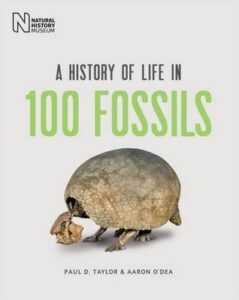 The History of Life in 100 Fossils, Paul D. Taylor, Aaron O’Dea
The History of Life in 100 Fossils, Paul D. Taylor, Aaron O’Dea
This isn’t entirely a coffee table book, but it is a little sparing on details — sometimes I really wanted to know how a certain fossil was formed, and they don’t mention it, or their related text is barely related to the actual fossil they’re presenting. And of course, there are fossils I’d like to see discussed and aren’t, and some I wouldn’t have put in my personal lineup of the history of life. Nonetheless, it’s fascinating to see someone else’s choices, and follow the timeline of the development of life through their examples.
And of course, some of the fossils are just flat-out gorgeous.
Rating: 4/5
Tags: book reviews, books, non-fiction, science
Posted October 11, 2019 by Nicky in Reviews / 2 Comments
 Fascism: A Warning, Madeleine Albright
Fascism: A Warning, Madeleine Albright
Part memoir, part political treatise, part history, Madeleine Albright’s book does a quick overview of Fascist regimes in history, taking in the obvious ones, digging into how they took power, legitimised themselves, and made it difficult to get rid of them by dismantling constitutions and laws. Most of that isn’t new to a casual student of history, though some of the details are, but then she moves into some of the more recent dictators and fascists of the world. In some cases, the leaders discussed don’t fit the definition of fascism as stated by her, and sometimes it feels more like the title should be Dictators: A Warning.
Her bias, as a former member of the Clinton administration, is obvious, but her respect for George W. Bush is a rather welcome note in that. Her lack of respect and trust for Trump is explicit, though she stops short of calling the Trump administration a fascist one (granted, the copy I read is from 2018, so her views may have updated somewhat since).
There’s some fascinating insights from Albright based on her experience, including of living leaders (Putin, for one), and her direct experience in Czechoslovakia. As I was reading it, I was thoroughly absorbed by her conversational and clear style. I do doubt how well it translates for people across the party line. (From the look of Goodreads, not well.) Interesting, though not entirely new to me in terms of what fascism looks like.
Rating: 4/5
Tags: book reviews, books, history, non-fiction
Posted October 3, 2019 by Nicky in Reviews / 3 Comments
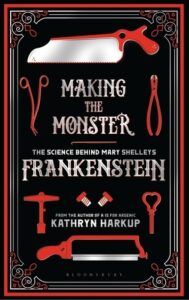 Making the Monster: The Science Behind Mary Shelley’s Frankenstein, Kathryn Harkup
Making the Monster: The Science Behind Mary Shelley’s Frankenstein, Kathryn Harkup
I really enjoyed Harkup’s book on Agatha Christie’s use of poisons in her plots — I wasn’t a Christie fan, but the book gave me a whole new appreciation for her work — so I jumped on this the minute I saw it. It begins largely as a biography of Mary Shelley, to be quite frank; there’s very little science for at least half the book, and there’s rather too much re-describing the plot. I get that the actual book isn’t familiar to everyone, but this is billed as pop-sci, not Sparknotes.
Nonetheless, when she does eventually get down to it, it’s fascinating to hear about the science of the day and what Shelley may have been aware of. Calling it the first science fiction book sounds a bit odd, because it’s not really the aesthetic you think of — but Shelley did research and was careful to reflect the science of the day. Maybe it’s not hard SF, and there’s much that seems unlikely now, but it’s still based on the understanding of science that she could possibly have been aware of.
Still a bit too biographical, overall: I believe seeing books in their context is important, but Mary Shelley’s parentage and miscarriages were less than necessary to the overall narrative.
Rating: 3/5
Tags: book reviews, books, non-fiction, science
Posted September 30, 2019 by Nicky in Reviews / 0 Comments
 Lost Languages: The Enigma of the World’s Undeciphered Scripts, Andrew Robinson
Lost Languages: The Enigma of the World’s Undeciphered Scripts, Andrew Robinson
This is a bit of a whistlestop tour of, well, the world’s undeciphered scripts. It starts off by exploring some scripts which have been deciphered — Mayan, Egyptian hieroglyphs, Linear B — and discussing how those decipherments were accomplished, and what if anything might be relevant in the study of other languages. After that, it introduces a few different undeciphered languages, including Linear A, Rongorongo and the Phaistos disc, discussing what we know and what we don’t, giving a little of the context, and figuring out to what extent any claimed modern decipherments are real.
It’s an interesting read, and reproduces a lot of photographs, sketches and diagrams showing these scripts and ways of deciphering them. Those images are probably really useful if you think in a very visual way, but they were somewhat limited for someone like me with no visual memory or imagination! It got a bit technical at times, but if that’s your interest then I’ve no doubt it’s useful and quite probably inspiring (in the sense of making you want to dig into these mysteries yourself).
I think Robinson’s attitude toward claimed decipherments is fairly cautious and conservative, but he takes the time to explain what his reservations are and what the field as a whole thinks of the ideas. It’s not always a riveting read, but it was overall pretty interesting and easy to absorb information from. Probably even better if you are, like I said, a visual sort of thinker/learner.
Rating: 4/5
Tags: book reviews, books, history, non-fiction
Posted September 27, 2019 by Nicky in Reviews / 0 Comments
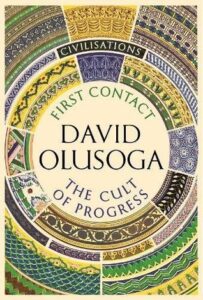 Civilisations: First Contact / The Cult of Progress, David Olusoga
Civilisations: First Contact / The Cult of Progress, David Olusoga
There’s a lot going on in this book: it sweeps past swathes of history, touching on some of the important questions and critiques of colonialism and empire, dwelling on how they were represented by artists and how art of different cultures met and mingled. It doesn’t linger, speeding past the Benin Bronzes and cramming in the Eiffel Tower as well, and I found it a little vague and unfocused. It was unclear what the argument was meant to be until the afterword, where he mentions the idea that all human art comes from “the same imagination”.
Hmm. A little insipid, really; that’s my final conclusion on this. It’s nice to have a quick guide to some of the art and its context, but it really is the most glancing look at most of it. It’s nice to have a degree of breadth, but then I wouldn’t say it has that much by way of breadth — it’s all so lightly touched on. There are some artworks I didn’t know about, and interesting facts, like the portraits painted by Lindauer of Maori people (and the fact that they would choose to be painted in a combination of Western and traditional clothing, to show they knew how to move in both worlds).
I feel like there are several books here and this is just a not very focused amalgamation of all of them. It didn’t work for me, though perhaps people who saw the series they accompany will get more out of it.
Rating: 2/5
Tags: book reviews, books, history, non-fiction
Posted September 26, 2019 by Nicky in Reviews / 0 Comments
 The Intersteller Age, Jim Bell
The Intersteller Age, Jim Bell
This was a pretty entertaining read about the Voyager missions, with the usual kind of autobiographical detail (extra odd Bell was more a fan of the project than a part of it, though he worked on things that were tangentially related at times) and some biographical detail. Lots of fanboying about Carl Sagan, which is sweet, but not always to the point. It’s a good overview of what the Voyager program did, and there were lots of little titbits I didn’t know.
I think the favourite part for me was discussing the Golden Record, though; I think I’ll have to look up the book he mentioned which goes into it in detail. I love the idea of the Golden Record (I did write a story about it a while ago, after all!), and I especially love the fact that we filled it with “our hopes, not our fears”. It makes it very clear that few people on the project thought there was much chance of it being found, but it was considered so important anyway: a moment for humanity to reflect on itself, and send out something of ourselves into the universe… the good parts, at least.
In terms of the engineering of the Voyager crafts, there’s relatively little, and though the math and physics of figuring out how to send them on their way is mentioned, it’s not explained. It’s more of a cultural history with explanations of what the Voyagers found than a science book, though there are interesting factoids about the various planets and moons of the Solar System which we wouldn’t have known (until later) without Voyager. Likewise, it discusses some of the problems that the Voyagers had — like the seizing of the camera platform — but not nearly all.
Entertaining, and probably as deep as some folks want to go!
Rating: 3/5
Tags: book reviews, books, history, non-fiction, science
 Women & Power: A Manifesto, Mary Beard
Women & Power: A Manifesto, Mary Beard








